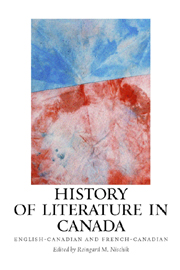Book contents
- Frontmatter
- Contents
- Acknowledgments
- Introduction: Writing a History of Literature in Canada
- I Beginnings
- II The Literature of New France, 1604–1760
- III The Literature of British Canada, 1763–1867
- IV From the Dominion to the Territorial Completion of the Nation, 1867–1918
- V The Modern Period, 1918–1967
- 11 Politics and Literature between Nationalism and Internationalism
- 12 English-Canadian Poetry, 1920–1960
- 13 The English-Canadian Novel and the Displacement of the Romance
- 14 The Modernist English-Canadian Short Story
- 15 Early English-Canadian Theater and Drama, 1918–1967
- 16 French Canada from the First World War to 1967: Historical Overview
- 17 French-Canadian Poetry up to the 1960s
- 18 The French-Canadian Novel between Tradition and Modernism
- 19 The French-Canadian Short Story
- 20 French-Canadian Drama from the 1930s to the Révolution tranquille
- VI Literature from 1967 to the Present
- Further Reading
- Notes on the Contributors
- Index
15 - Early English-Canadian Theater and Drama, 1918–1967
from V - The Modern Period, 1918–1967
Published online by Cambridge University Press: 12 September 2012
- Frontmatter
- Contents
- Acknowledgments
- Introduction: Writing a History of Literature in Canada
- I Beginnings
- II The Literature of New France, 1604–1760
- III The Literature of British Canada, 1763–1867
- IV From the Dominion to the Territorial Completion of the Nation, 1867–1918
- V The Modern Period, 1918–1967
- 11 Politics and Literature between Nationalism and Internationalism
- 12 English-Canadian Poetry, 1920–1960
- 13 The English-Canadian Novel and the Displacement of the Romance
- 14 The Modernist English-Canadian Short Story
- 15 Early English-Canadian Theater and Drama, 1918–1967
- 16 French Canada from the First World War to 1967: Historical Overview
- 17 French-Canadian Poetry up to the 1960s
- 18 The French-Canadian Novel between Tradition and Modernism
- 19 The French-Canadian Short Story
- 20 French-Canadian Drama from the 1930s to the Révolution tranquille
- VI Literature from 1967 to the Present
- Further Reading
- Notes on the Contributors
- Index
Summary
AFTER FOUR YEARS OF CARNAGE Canada emerged from the Great War in 1918 bloodied but victorious, with a strengthened sense of national confidence and pride. The nation shared a feeling that it had come of age, its soldiers having proved themselves equal to any other combatants in their courage, ability, and self-sacrifice across the western front, at Vimy Ridge, and in the fields of Flanders. Canadian attitudes towards Great Britain changed significantly. Though English Canadians still considered theirs a British nation, they could no longer be content to be treated like colonial children by the mother country whose men they had fought alongside on the road to victory. The Canadian government began to insist on equality of political representation, sending its own delegation to the postwar negotiations at Versailles. Within a decade it would appoint Vincent Massey its first ambassador to Washington, and the British embassy no longer presumed to speak on behalf of Canadian interests in the United States.
The end of the war also brought about changed relations and attitudes towards the United States. Long-held prejudices against the presumed arrogance of Americans were reinforced by the self-congratulatory attitudes of their politicians and press, who boasted that American intervention had won the war. Canadians bitterly pointed out that the United States had joined the fighting three years after Canadians entered the war and that, relative to population, Canada had suffered ten times more casualties. Nevertheless, the United States and Canada had fought together as allies, and the United States emerged from the war rich and powerful, while Britain was exhausted and nearly broke.
- Type
- Chapter
- Information
- History of Literature in CanadaEnglish-Canadian and French-Canadian, pp. 207 - 221Publisher: Boydell & BrewerPrint publication year: 2008



